Gray (Book 1) Read online
Page 4
Finally, she crested the hill. She sat and allowed herself a quick drink. The warm moisture felt so good on her dry throat, she wanted to gulp and gulp. Forcing herself to stop took a powerful act of will. She capped the bottle and sat, her head hanging with weariness.
Coral jerked awake. She had almost nodded off. The water bottle was still in her hand. She gripped it harder, her stomach lurching at the thought she might have dropped it or let it roll off. It was her salvation.
A thin layer of ash had coated her arms below her sleeves and had turned to a gray mud as she walked and sweated. As she rested, the mud dried to a thin layer of mortar; this cracked as she stretched and stood. It itched, and she rubbed her arms against her sides to ease the irritation.
The downhill walk was easier. The air was still hot, the pack was still heavy, and she was still weak from hunger and thirst, but at least she wasn’t fighting gravity, too. Still, her breath came harder than it should have and she felt as if she wasn’t getting enough air. She wondered if her lungs were filling with fine ash, and if she could suffocate from it.
Probably. Another thing to avoid thinking about. She had to do what she could, which was put one foot in front of the other, to keep going. Finally, she reached the bottom of the hill.
She stopped for another rest, taking another sip of precious water. Her water bottle was half empty and it couldn’t yet be noon. She simply could not hike at this level of effort and keep to her rationing plan.
She had to find a water source, and today. If she didn’t, she’d die out here, alone in the dim, gray world.
What to do? She was at the bottom of another hill. Somewhere in these hills, there should be a stream or a trickle of water, snowmelt. Even if the heat had evaporated some standing water, it would have melted snow and glacier at higher elevations, too, and sent water downhill. She didn’t know if she could make it up another long grade. This was her best chance, to commit right now to finding a stream by following the cleft in the hills.
Turning right, she kept her back to the road, making her way to lower and lower ground. Before the fire, this route would have been impassible, with undergrowth tearing at her, and thick brush blocking her path. Little of that growth remained, only the occasional charred skeleton of a fire-resistant bush. She stumbled over rocks made slick by the carpet of ash. Once she slipped and fell, landing hard on her butt. For an instant, she considered lying there for about a week or so, but after a few shaky breaths, she forced herself up again. To stop now was to choose death.
When the land began to rise again, she backed up a few feet and sought the lowest course instead. Keeping to the deepest part of the valley, she hiked on. Every once in awhile, she stopped to listen for the sound of water, holding her breath to listen better, but she heard nothing but the hard beating of her own heart.
Mid-afternoon, as she reckoned it, Coral had to stop and rest. She was about to fall asleep on her feet She hunted for a flat space for her sleeping bag, finally settling on laying it out in the V of the path she was walking. Sleep came over her.
Thirst woke her an hour or so later. It nattered and poked at her as she rolled up her bag and stowed it. She couldn’t guess the time—still daylight, still hot. Irrationally, she felt like screaming at the heat to back off. She took only a tiny sip of liquid and set off again.
She could die out here. She didn’t want to die. She wanted to live, to know what had happened, to get to a phone. She wanted to see a town again, a store, a damned drinking fountain. She wanted to hear her brothers’ voices, and her grandmother’s. She stopped and closed her eyes, forcing an end to this spiral of useless thoughts.
After steady minutes more of hiking, she could tell the daylight had begun to fade. Was this day five ending, or six, or a different day? She tried to work it out, setting her mind to the puzzle as a diversion from her thirst and exhausting. But she couldn’t work out how long had passed.
Abruptly, she came to her body again, noticing her surroundings. The ground beneath her feet was sloping downward more rapidly now. Hope sprang up in her and sped her steps. She had to force herself to stop every few dozen strides and listen for running water. As she hiked downhill, the daylight continued to fade.
She never heard the water flowing. She had to step into it to know it was there. Her boot splashed into a stream of snowmelt.
Coral dropped to her knees and thrust her hands into the water. It was wonderfully cool, the first cool thing she had touched since leaving the walls of the deep cave. She splashed water on her face, sucking water through her dry lips.
Mud. Grit. This was water, but it wasn’t pure. Still, it was wet. If swallowing a bit of dirt would hurt her, so be it. She needed the moisture.
After several swallows, she stopped drinking and took out her water bottle, draining the liquid remaining there in a few swallows. She sat cross-legged, filling her bottle again in the snowmelt stream. Maybe if she let it sit, the grit would precipitate out of it, and she could decant clearer water.
Night came on. Coral let herself drink. The water in her bottle felt clearer, now, though she couldn’t see it—or anything else, for that matter. She luxuriated in the taste and feel of water sliding down her throat. Despite the bits of grit, it was still the best thing she had ever tasted. She decanted the fresh water, stopping when she felt mud touch her lips.
She laughed aloud in pleasure as she rinsed then refilled the bottle and unpacked all her others, too. She had found water; she was going to live.
For a few days, at least.
She slept again, and when she woke, she felt her body coming alive. For the first time in almost a week, her bowels rumbled to life. Her kidneys and bladder, she was happy to find, still remembered how to work, though peeing burned like acid.
As day broke, and the valley turned from black to dark gray, she drank her fill from the bottles, filled them again, and let the sediments settle for about an hour, then drank again. She used more water to rinse dust out of her bandana. Her thirst was nearly slaked. She filled every bottle to the brim, giving herself nearly a gallon of water spread over five bottles.
She broke camp. It was time to move on, to find other people, to get back to civilization. And find something to eat. Her thirst relieved, she was made aware of her weakness. She needed fuel, and soon.
Chapter 4
Hydrated, she made better time. The stream of melt water was her guide. Following the water’s course might delay her making her way back to other people, but she couldn’t abandon the life-sustaining liquid, and certainly not for a vague hope. Eventually, she knew, water had to lead to a town. Find a river, keep moving downstream, you’ll find a town, guaranteed.
Lunch was water. Supper was water. What she’d give for a handful of crackers.
In this fire-wasted land, she could see that she would find no plant food, no spring berries or miner’s lettuce. No mushrooms. Maybe root vegetables, but without their tops, there was no way to find them, even if she knew what was edible—and she didn’t. She didn’t see any animal tracks, either, though even if she had, she had no idea how she could trap or kill one. An animal certainly wouldn’t be willing to sit patiently while she beat it to death with a rock.
But she had her rod and reel and this trickle of water running away downhill, and that gave her hope of finding a bigger stream with fish.
She followed the water as it found its way to lower ground. For two more days she walked, fueled only by water and her own determination. Steadily the stream grew broader as other snowmelt trickles joined it. She expected mosquitoes to appear, but none did. In fact, she saw no sign of insects at all—not in the air, and not in the water. Maybe the heat had killed them all, too. Soon, the stream grew wide enough so that, by the time the light was fading the second night, she could no longer jump across. It was an established stream, not just random melt water flow. It had carved a place for itself years before.
Bushes and small trees began to appear inside its edges, some standin
g in water, their bases having survived the fire. No leaf had survived. One tall pine had fallen and the fire on it had been put out, leaving its charred trunk half in the water, with unburnt wood submerged on the other side. The stream spilled noisily over it.
On the fourth morning since she had left the cave, another sizeable stream joined the one she had been following. A dark smudge of mud spread from its mouth into the main watercourse. She walked downstream of that spot and peered into the stream. There was enough water that she believed fish might be swimming in these murky pools.
When she peeled the pack off and looked at the rod. She stuck her finger into the reel, feeling a dried mess of molded plastic. She pulled out her knife and sat down, opening the reel. Carefully, she began to slice away at the melted line, hoping that deeper down, individual strands would have stayed separate.
No such luck. She had to carve away every bit of what had once been more line than she would ever need, had she fished with it to the age 100. She had that little bit of line in her emergency survival kit. That might be enough. Not for casting and reeling in, but to tie to the last eyelet of her rod. She’d be fishing as she had when she was five years old, with a simple pole and line.
She unpacked her backpack, finding the tackle box at the bottom of the bag and the black film container with its few survival supplies. She repacked everything else before she opened the tackle box.
Among her lures, she had a tiny glass jar of red salmon eggs, just bought in Wyoming at the advice of a bait store clerk. And the lures: a sculpin, a small crayfish, a silvery minnow, a purple worm, and a package of neon pink scuds.
She flipped back the second compartment of the box. Here, she kept weights, corks, leaders, a scaling knife. And—a chill of relief—a tangled mess of monofilament she’d never thrown away. Now she remembered putting it there. At a lake she’d fished in southern Montana, she had gotten her line entangled in some bushes. She felt silly—it was a novice’s mistake, and she was no novice at angling, having been taught by her mother when she was just four or five. That day in Montana, she hadn’t been paying close enough attention to her casts, watching birds fishing the lake across the way instead. Coral had been taught to take her angling responsibilities seriously, and so she had collected the knot of line. Pack all your trash out, is the rule, so she put the mess in the tackle box, meaning to toss it into a trashcan later.
Thank heavens she had not.
Coral tied on her emergency line, baited the hook, and let it dangle in the stream. While she waited for a bite, she sat cross-legged, the knotted wad of line in her lap, and began to work at untangling it. She found the two ends and worked for a while from one end, then switched to the other and worked at that. Under the gray sky, it was like trying to thread a needle in the moonlight. The chore tried her patience, but what else was there to do but stick with it? Picking at the line with her fingernails and teeth, feeding the loose ends back through knots, she gradually saw the length of line slowly emerge.
It wasn’t a lot. But it was enough to tie to the rod. She pulled in the rod, cut off the emergency line just at the grommet, and wound it back into her emergency kit. The untangled line she secured carefully to the reel, knotting it onto three grommets; she couldn’t afford to lose it. She had enough line so that she could cast across the stream now.
If, that is, she could find any living fish. After a half-hour or so of no luck, she gathered her gear and went downstream to try another likely spot.
All that day, she stopped every so often to cast her line in the stream. No fins broke the murky surface, no bubbles told of rising trout. In the muddy melt water, swirls that would have given away feeding fish were impossible to see. When she could spot a rock, she fished the eddies behind it where fish were likely to hide from the current.
Once, at a shallow bend in the stream, she waded into the water to cast into the pools at the bottom of the far bank. The coldness of the water numbed her flesh within minutes and she walked out on deadened legs, shivering for the first time in weeks. Shivering probably burned calories she didn’t have to spare. After that, she kept to the banks.
That day, she moved on as far as she could manage while continuing to fish from time to time. The temperature kept dropping, easing off from its high of several days ago, until at night she finally felt comfortable. Sleep came easier than it had in a week.
The next morning, which she thought might be the ninth since The Event, though she knew she had lost track she set off again, but her energy was low. She often felt as if she were struggling for breath, despite the flatness of the terrain here. As she walked on without food, she could feel her clothes grow looser each day. She stopped often to cast her line into the stream.
When she got her first bite, she was so surprised, she reacted too slowly. She reeled in her line but the little eggs were gone, stolen by a quick fish. Her heart tripped with excitement. She slid more of the slick red eggs onto the hook and cast again to the same spot, staring at the line and willing it to move. When fishing had been something she did for fun, it had been pleasant and slow, a meditation, and it didn’t matter if she caught fish or not. Today, knowing she was battling starvation, each cast was something else entirely, a life-and-death drama.
What felt like an eternity later, she felt another twitch in the line. She held her breath and waited, her hands quivering on the rod. Take it, fish, take it. The line jerked and she snapped her wrist, setting the hook. She reeled in the fish quickly against its slight struggles. It was a tiny trout, not even as long as her hand.
She dug out her knife and slit the fish open, scooping out the guts with her fingertips and flicking them to the ground. Slicing between the bones and skin, she laid open the meat on one side of the fish, stripping off half of one fillet. She bit into the raw orange flesh, scraping meat from the skin with her teeth and swallowing without chewing. The cramp in her belly as the food hit it felt half painful, half pleasurable. She ate the other fillet, then took the center of the fish and sucked the remaining bits of flesh off the bones, then scraped with her teeth, getting every bit she could.
The fish was gone quickly, much too soon—even the head she ate, the eyes, then the skin, cut into strips and choked down, everything but the bones and guts. She tossed the bones down and slid more red eggs onto the hook.
As she waited for another bite on her line, she used one hand to squeeze out the fish’s stomach, hoping to get a clue about what better lure or bait to use. She saw a few midges, immature mayflies, nothing she had on hand as bait or lure. The fish had been hungry, too.
Coral caught four more trout with the red egg bait, eating two more and keeping the two largest fish for later. Her mind told her that she could eat a dozen more fish, but her stomach might not hold more yet. The rest of her body, deprived of food for days now, wanted more and more fuel, but she knew it might only make her sick to give in to that desperate hunger too quickly. And maybe she’d luck into some fuel, some wood that the fire had spared, so she could cook these last two.
Feeling deep gratitude, she closed her eyes and silently thanked Nature for the gift of the fish, thanked the fish for giving their lives to keep her alive. She was not the type who prayed, but in this moment, it seemed right to acknowledge the connection between her and the trout and whatever god or goddess there might be, even were that goddess the earth itself. A few moments ago, the fish had been imbued with spirit, silvery flashes moving through the deep and cold muddy water. Now they were part of her. This connection was a reality as old as life on Earth but made new for Coral today.
She decided to stay put, to rest and keep fishing here for another day. As much as she wanted to find people, to find an answer to the mystery of what was happening, eating was far more important.
No more fish bit that day, so her dinner was the fish she had saved from the morning. She refused to let disappointment in the afternoon’s angling take root; she simply sat and conserved her energy. The next morning she was rewarded for h
er patience when the fish began biting again in the very same spot soon after dawn
It was a good morning of fishing. She hauled in nine trout. She ate three for breakfast and cleaned the other six of their guts, then put them into the plastic bag that once held her toilet paper. That she tied onto the outside of her pack. After she broke camp, she set off downstream again, feeling more energy and hope than she had in a week.
*
Later that day, it began to rain. The splash of the rain on her face surprised her. She thought now nice it would be, a refreshing rain.
But within moments, Coral was wretched. As the rain fell through the ash, the two substances combined. It wasn’t raining water but a thin, gritty mud.
There wasn’t even a stand of fir trees to hide beneath. The canopy had been decimated by the wildfire. Coral moved to a large boulder and leaned against it, miserable, trying to find a lee side without success. The mud rained down on her, coating her clothes and her hair. Some dribbled off her hair and into her eyes. She couldn’t blink it out. The freak mud storm seemed unfair, after all she had endured. The grit in her eyes stung. She shrugged off her pack and waded into the stream.
The current swept her off her feet. In an instant, she was tumbling downstream. Her knee hit a submerged rock and she spun around. Before she could gain her feet, she was pinned against the branches of a fallen tree. Water surged onto her face, plastering her bandana against her face. She sputtered into the wet cloth, swallowing gritty water. Fumbling behind herself for a handhold, she found a branch. She pulled herself up a few inches and turned her face away from the onrushing stream. The mask made it hard to breathe. She rubbed her face against the tree until it moved below her mouth, and she hung on and breathed.

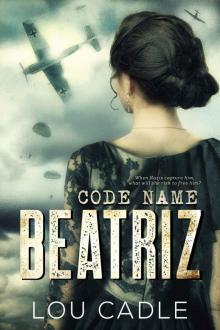 Code Name- Beatriz
Code Name- Beatriz Oil Apocalypse Collection
Oil Apocalypse Collection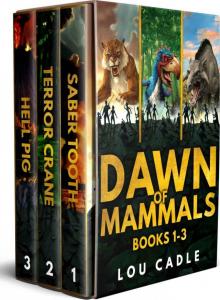 A Dawn of Mammals Collection
A Dawn of Mammals Collection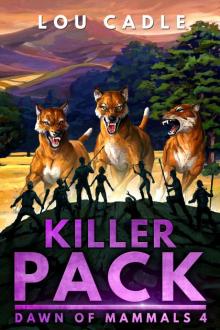 Killer Pack (Dawn of Mammals Book 4)
Killer Pack (Dawn of Mammals Book 4)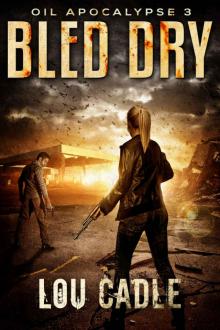 Bled Dry
Bled Dry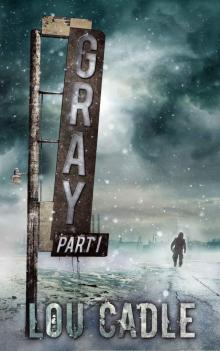 Gray (Book 1)
Gray (Book 1) Dawn of Mammals (Book 4): Killer Pack
Dawn of Mammals (Book 4): Killer Pack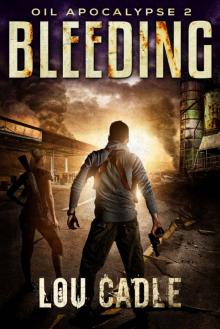 Bleeding (Oil Apocalypse Book 2)
Bleeding (Oil Apocalypse Book 2)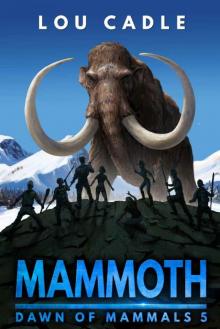 Dawn of Mammals (Book 5): Mammoth
Dawn of Mammals (Book 5): Mammoth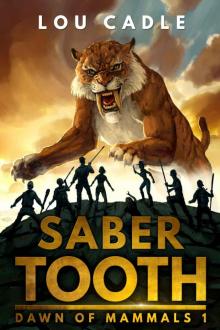 Saber Tooth (Dawn of Mammals Book 1)
Saber Tooth (Dawn of Mammals Book 1)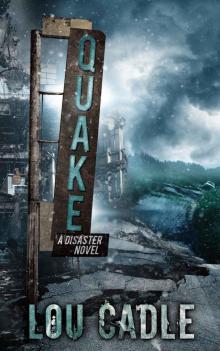 Natural Disaster (Book 2): Quake
Natural Disaster (Book 2): Quake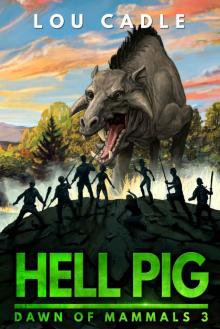 Hell Pig (Dawn of Mammals Book 3)
Hell Pig (Dawn of Mammals Book 3)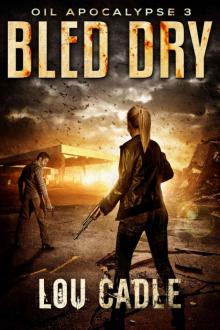 Bled Dry (Oil Apocalypse Book 3)
Bled Dry (Oil Apocalypse Book 3)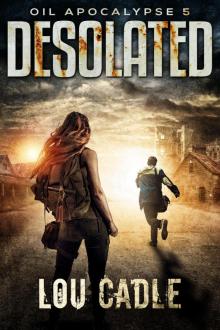 Desolated
Desolated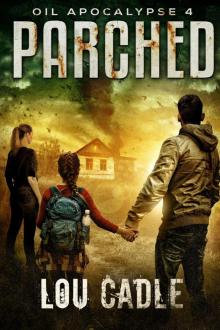 Parched
Parched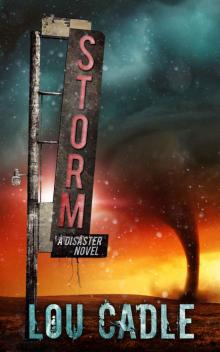 Natural Disaster (Book 3): Storm
Natural Disaster (Book 3): Storm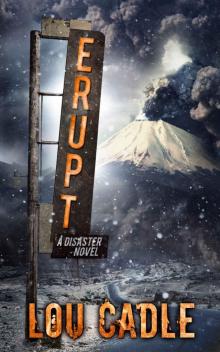 Natural Disaster (Book 1): Erupt
Natural Disaster (Book 1): Erupt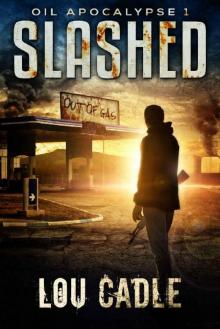 Slashed (Oil Apocalypse Book 1)
Slashed (Oil Apocalypse Book 1)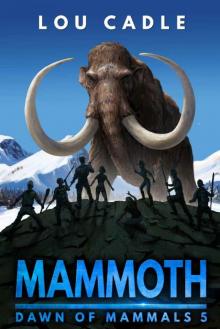 Mammoth (Dawn of Mammals Book 5)
Mammoth (Dawn of Mammals Book 5)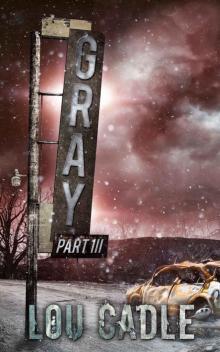 Gray (Book 3)
Gray (Book 3)